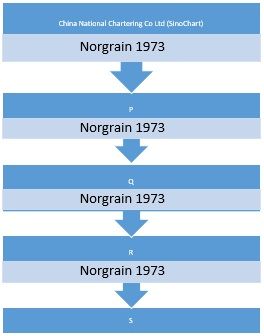P v. Q (Capetan Giorgis) [2018] EWHC 1399 (Comm)
The Commercial Court has recently issued helpful guidance on how
parties can protect themselves from last minute incoming claims if
they are in a back-to-back charter chain. Among other things, the
Court considered how to ensure that any claims can still be passed
up or down the charter chain and what to do if a contractual time
bar is missed in those circumstances.
The background facts
The charterparty chain

The charters were subject to English law and London arbitration, and all contained the following time bar clause:
"Any claim other than the demurrage claim under this contract shall be notified in writing to the other party and claimant's arbitrator appointed within thirteen (13) months of the final discharge of the cargo and where this provision is not complied with, the claim shall be deemed to be waived and absolutely barred."
The timeline of events
The events surrounding the claims were as follows:
16 October 2015
The vessel completes discharge at Nansha, China.
9 September 2016
Without any prior indication, a cargo claim is commenced against the Head Owners in Xiamen Maritime Court.
16 November 2016 (last day of the time limit in each charter)
The Head Owners give notice of a claim and commence arbitration against Sinochart. Sinochart send a similar notice to P and commence arbitration. The notification and commencement of arbitration are sent after P's business hours.
The time limits under all charters expire
17 November 2016
P becomes aware of the claim for the first time. P informs Q of the claim it has received, but does not commence arbitration as its operations department gathers more information. Q informs R of the claim and commences arbitration against R.
23 November 2016
P's operations department informs its legal department of the incoming Sinochart claim for the first time, six days after first receiving the notice. P becomes aware of the terms of the time bar clause.
25 November 2016
P commences arbitration against Q, eight days after first receiving the incoming claim against it.
30 November 2016
Following a dispute between Q and R about the validity of the service of Q's notice of arbitration, Q serves a fresh notice on R without prejudice to its 17 November 2016 notice.
1 December 2016
R serves notice on S of its claim and commences arbitration.
The dispute
The Claimants P, Q and R, all applied for declarations that:
1. Their claims had been brought in time, notwithstanding the wording of clause 67 ("The Construction Issue");
2. In the alternative, the Claimants applied for an order under section 12 of the [WB1] ("the Act") extending the time for commencing arbitration ("The Section 12 Application Issue").
The Charterers opposed both applications.
The Commercial Court decision
The Construction Issue
The Court wholly rejected the Claimants' arguments. It interpreted clause 67 literally and found as follows:
(i) the wording of the clause was clear and unambiguous;
(ii) commercial sense favoured a literal construction: at the end of the limitation period, the parties would know where they stood and avoid the uncertainty of unexpected claims. This benefited all parties; and
(iii) the parties agreed to take the risk that they might not be able to pass on validly received claims after expiration of the limitation period.
The Court also held that the fact that the charterparties were part of a chain did not affect the interpretation of the time bar clause in each charter.
The Section 12 Application Issue
Section 12 allows a party, in certain circumstances, to apply to the Court to extend a contractual time limit. It is a relatively difficult test to meet: the starting point is always that the parties intended the time bar to apply.
The relevant part of section 12(3) provides that the Court shall make an order only if satisfied that:
(a) the circumstances were outside the reasonable contemplation of the parties when they agreed the time limit, and
(b) it would be just to extend time.
In assessing whether the first limb of this test had been met, the Court in this case was satisfied that:
(i) the circumstances (i.e. a party in the charter chain receiving entirely unanticipated claims after business hours on the final day of the limitation period) were "relatively exceptional" as opposed to "not unlikely", "not unusual" or "prone to occur";
(ii) had the parties contemplated the circumstances when contracting, they would also have contemplated that the time bar might not apply; and
(iii) the circumstances caused or significantly contributed to the Claimants' failure to comply with the time bar.
Accordingly, the first limb of the test was satisfied.
In considering the second limb of the test, the Court ruled that it would only be just to extend time if the applicant had acted expeditiously and in a commercially appropriate fashion. In assessing this issue, the Court looked at the behaviour of the parties in passing on the claims:

The Court granted relief only to Q who, upon notification that a claim had been made against P, was able to notify R and commence arbitration on the same day. Neither P nor R acted expeditiously and so were not entitled to relief under s.12.
In assessing the behaviour of the parties, the Court also provided helpful guidance on what it thought would be expeditious behaviour in these circumstances. It found that a party had three days (weekends and holidays included) to pass on notice of the claim and commence arbitration if it wanted to rely on s.12.
How to manage the risk of last minute claims
There is clearly risk involved in any chain of back to back charters with a fixed time limit. In terms of managing the risk of last minute claims, parties should consider the following:
- Is it better to agree a time bar clause that allows for late indemnity claims (for example, one modelled on Art III r6 bis of the Hague-Visby Rules)? This decreases the risk, but perhaps also the certainty that a fixed time bar provides;
- Where there is any possibility of a claim:
> Agree appropriate extensions of time; or
> Commence arbitration as a protective measure.
- If presented with an unanticipated last minute claim, comply with the time bar deadline if at all possible – that way, the problem never arises. In the present case, Sinochart were able to respond quickly and avoid being caught up in the time bar argument;
- If impossible to meet the time limit, s.12 means that there may be some hope to still pass on the claims, but it is important to act quickly. Contrast the position of Q (who was able to react quickly) and P (who was not). In particular, P's operations team only passed the claim notice to its legal department after six days – already too late to protect its position.
Comment
This judgment reaffirms the English courts' literal approach to the interpretation of time bar clauses and gives helpful guidance to parties who find themselves on the receiving end of last minute claims.
It also highlights the importance for parties of having good internal communications and reporting systems in place, both between their commercial and their legal teams, as well as with their P&I Clubs.
02.10.2018
The content of this article is intended to provide a general guide to the subject matter. Specialist advice should be sought about your specific circumstances.

